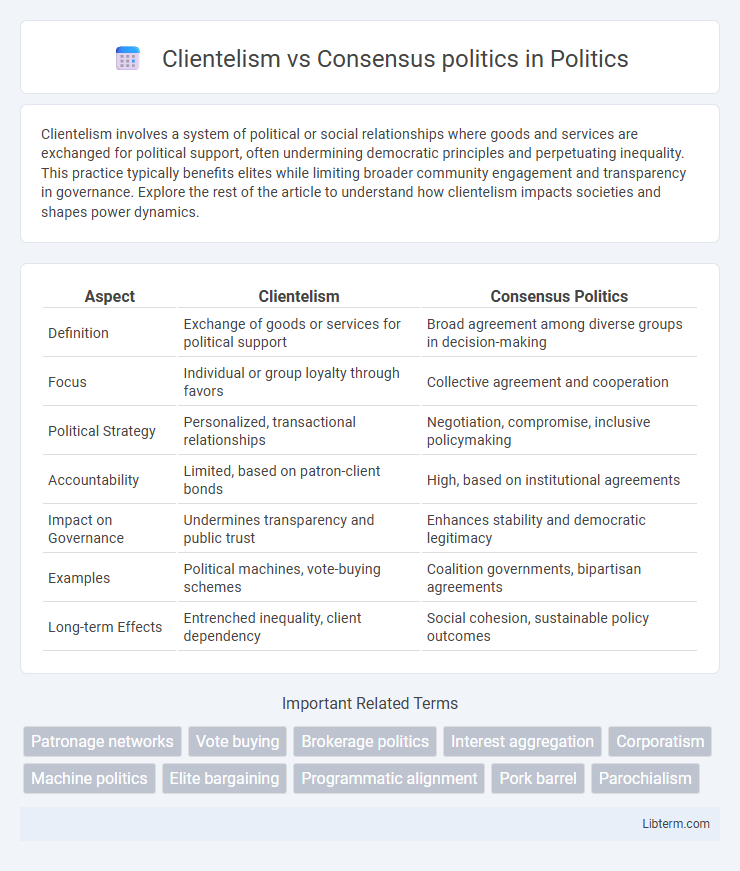Clientelism involves a system of political or social relationships where goods and services are exchanged for political support, often undermining democratic principles and perpetuating inequality. This practice typically benefits elites while limiting broader community engagement and transparency in governance. Explore the rest of the article to understand how clientelism impacts societies and shapes power dynamics.
Table of Comparison
| Aspect | Clientelism | Consensus Politics |
|---|---|---|
| Definition | Exchange of goods or services for political support | Broad agreement among diverse groups in decision-making |
| Focus | Individual or group loyalty through favors | Collective agreement and cooperation |
| Political Strategy | Personalized, transactional relationships | Negotiation, compromise, inclusive policymaking |
| Accountability | Limited, based on patron-client bonds | High, based on institutional agreements |
| Impact on Governance | Undermines transparency and public trust | Enhances stability and democratic legitimacy |
| Examples | Political machines, vote-buying schemes | Coalition governments, bipartisan agreements |
| Long-term Effects | Entrenched inequality, client dependency | Social cohesion, sustainable policy outcomes |
Defining Clientelism in Politics
Clientelism in politics refers to a system where goods or services are exchanged for political support, often involving patron-client relationships that foster dependency and limit inclusive governance. This practice undermines democratic ideals by prioritizing personal loyalty over policy consensus and institutional trust. Unlike consensus politics, which emphasizes cooperation and broad agreement, clientelism distorts political representation through personalized and transactional interactions.
Understanding Consensus Politics
Consensus politics emphasizes collaboration among diverse political actors to achieve broad agreement on policy decisions, fostering political stability and reducing conflict. It relies on power-sharing mechanisms, coalition governance, and inclusive institutional frameworks to represent multiple interests equitably. This approach contrasts with clientelism by prioritizing collective decision-making over personalized exchanges of favors, promoting transparent and accountable governance structures.
Historical Roots of Clientelism
Clientelism has deep historical roots tracing back to ancient patronage systems where political support was exchanged for material benefits, establishing a personalized network of obligations and loyalty. Unlike consensus politics, which relies on formal agreements and institutional cooperation among diverse groups to maintain stability, clientelism operates through informal, often hierarchical relationships based on reciprocal favors. This historical clientelist framework persists in many developing nations, influencing contemporary political behavior and undermining institutional transparency and democratic processes.
The Core Principles of Consensus Politics
Consensus politics centers on power-sharing, inclusivity, and compromise among diverse political groups to achieve stable governance. It emphasizes broad-based cooperation, institutional checks and balances, and proportional representation, aiming to reflect multiple interests fairly. Key principles include mutual respect, the avoidance of majoritarian dominance, and fostering dialogue to build collective agreements.
Mechanisms of Clientelist Networks
Clientelist networks operate through personalized exchanges where political support is secured by distributing goods, services, or favors directly to individuals or groups, bypassing formal institutions. These mechanisms rely on reciprocal relationships, where patrons provide resources to clients in return for loyalty and votes, reinforcing dependency and limiting collective action. Clientelist practices undermine consensus politics by fragmenting society into competing interest groups rather than fostering inclusive decision-making based on shared norms and broad agreements.
Advantages and Disadvantages of Consensus Approaches
Consensus politics promotes inclusive decision-making and power-sharing, fostering political stability and broad representation which reduces social conflict and polarization. However, this approach may slow down policy implementation and lead to compromises that dilute decisive action or coherent policy direction. In contrast, clientelism often secures immediate support through personal networks but undermines institutional integrity and long-term democratic development.
Clientelism’s Impact on Democratic Institutions
Clientelism undermines democratic institutions by fostering unequal political participation and eroding accountability through exchange-based relationships between politicians and voters. It distorts policy-making by prioritizing personal or group interests over public welfare, weakening institutional checks and balances. Persistent clientelistic practices contribute to political instability and hinder the development of transparent, inclusive democratic governance.
Promoting Inclusivity through Consensus Politics
Consensus politics fosters inclusivity by emphasizing collaborative decision-making and broad representation of diverse social groups, contrasting with clientelism's reliance on patron-client networks that often exclude marginalized voices. This approach strengthens democratic legitimacy and social cohesion by encouraging dialogue and compromise among political actors, ensuring policies reflect collective interests rather than narrow factions. Through institutionalized mechanisms like proportional representation and coalition governance, consensus politics promotes equitable participation and mitigates power imbalances inherent in clientelist systems.
Case Studies: Clientelism vs Consensus in Practice
Case studies of clientelism versus consensus politics reveal stark contrasts in governance and policy implementation, with clientelism often fostering patronage networks that undermine institutional transparency, as seen in countries like Brazil and the Philippines. Consensus politics, exemplified by nations such as Switzerland and the Netherlands, emphasizes inclusive decision-making processes that enhance political stability and social cohesion. Empirical analyses demonstrate that clientelist practices correlate with increased corruption indices and weakened democratic institutions, whereas consensus-based systems typically report higher levels of public trust and policy effectiveness.
Future Trends: Shifts Toward Consensus or Persistence of Clientelism
Emerging political trends suggest a gradual shift toward consensus politics driven by increasing demand for transparency, institutional reforms, and civic engagement. However, clientelism persists in many regions due to entrenched patronage networks, socioeconomic inequalities, and weak governance structures that facilitate personalized vote-buying and resource distribution. The future balance between these models will largely depend on the effectiveness of anti-corruption measures and the expansion of democratic participation mechanisms.
Clientelism Infographic

 libterm.com
libterm.com